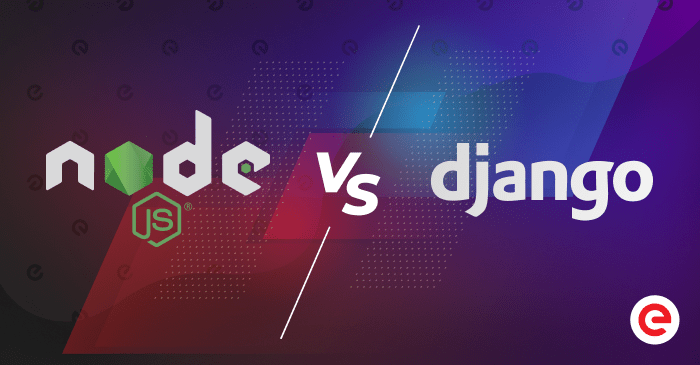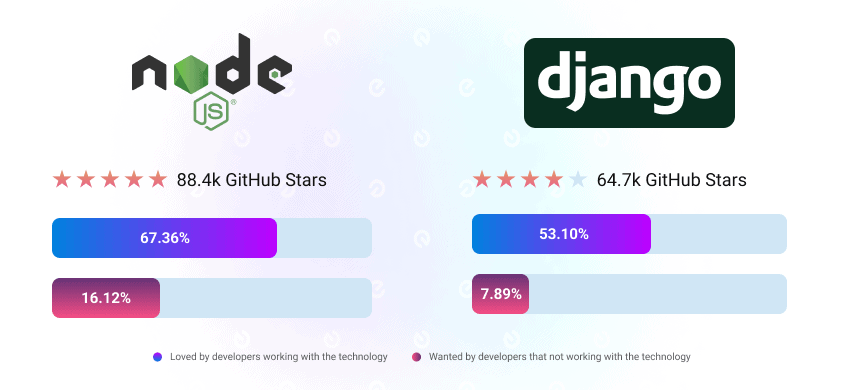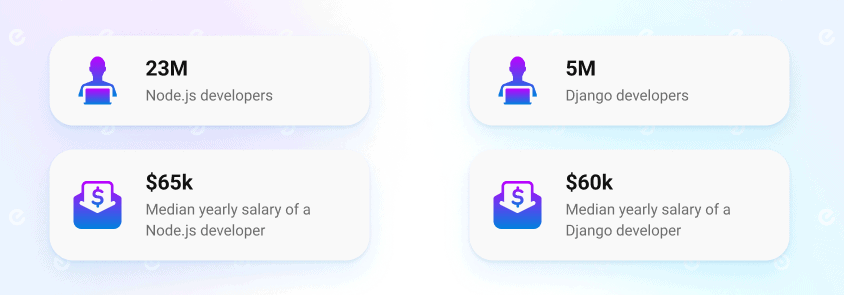
July 18, 2022
Have you realized how important the technology choice can become for the project? The good tech stack outlines core aspects and streamlines the development process. Talking about web solutions, businesses draw special attention to supporting the extensive user experience. At the same time, a smooth front-end experience isn’t possible without a reliable backend. The meaningful technology comparison and comprehensive requirements analysis helps to define the smallest details and choose the best set of tools and development approaches. In this article, we’ll address the question of Node.js vs Django and how they can be used in web development.
List of the Content
- What is Node.js and how is it used?
- What is Django and how is it used?
- Why Node.js vs Django for web development?
- Django vs Node.js comparison
- Node.js vs Django: which is better?
- In conclusion
WHAT IS NODE.JS AND HOW IS IT USED?
In the light of comparing Node.js vs Django, it’s great to find out key aspects of each competitor and how these technologies gained market shares. Choosing the right tech stack without a clear understanding of both technical and business points seems challenging.

As a result, this solution has brought numerous opportunities for JavaScript server-side development to build scalable network applications. It’s a fact that JS’s popularity supports Node.js’ popularity. Javascript has always been full of different libraries and frameworks, though that’s Node.js which brought valuable solutions for JavaScript backend development. In fact, Node.js enables JacaScript utilization to the fullest. It helps to unify web app development around one programming language, JavaScript. By choosing Node.js, developers eliminate the need to deal with multiple languages for the client- and server-side scripts. Moreover, they can develop REST APIs for seamless and faster implementation of web applications. Node.js presents different in-built modules and other distinct features to advance app development.
Thanks to the fast evolution, Node.js has become extremely popular among developers. According to StackOverflow Developer Survey 2022, Node.js takes first among the most common web technologies. So what are the features that make Node.js attractive for both developers and businesses?
- It’s an open-source JavaScript runtime environment for building web applications.
- Node.js follows event-driven programming.
- It runs on different operating systems like Windows, macOS, and Linux.
- Node.js has a large ecosystem of libraries, frameworks and tools that support a consistent and cleaner codebase.
- The entire development process can be handled only by applying JavaScript.
- The most common use cases include backend development, web app prototyping, agile software development, etc.
- Node.js has the largest and fastest-growing community with strong support and feedback.
Continuing on the Node.js vs Django choice, it might be useful to check on other good market practices where they’re applied. Even though someone considers Node.js as a relatively new technology, a number of projects implemented with Node.js are impressive. You can find market aggregators among companies that use Node.js, like PayPal, Netflix, Uber, LinkedIn, Groupon, etc. The great advantage is that businesses have the opportunity to fulfill different needs by applying Node.js. For example, PayPal and Netflix used Node.js to build UI. LinkedIn and Groupon have successfully switched from Ruby on Rails to Node.js in both web and mobile solutions. This choice was also supported by numerous benefits they gained by using this technology. It involved great performance, fast implementation, scalability, cost management, etc.
Want to find more details on Node.js development?
It might be useful to check another great article on backend development with Node.js. It covers interesting details about Node.js functionality, benefits and market prices.
WHAT IS DJANGO AND HOW IS IT USED?
It’s always challenging to select the right technology stack due to project needs. Considering the question of Node.js vs Django, we will proceed with the next representative Django. It’s a common practice to make a comprehensive requirements analysis, whereas the team can’t go without meaningful comparison. They have to define a number of decisive aspects of each technology before making the final choice.
As for the market choice, Django definitely belongs among web development’s most commonly used technologies. It’s a free, open-source web framework for building web applications. Simon Willison and Adrian Holovaty created Django in 2003 for the needs of the newspaper company. But in 2005, it was released for public use, and now it is supported by the independent Django Software Foundation. The good thing about this technology is that it’s written in Python. Teams starting web development with Python find it quite beneficial to proceed with Django for the application backend. Besides, the technology follows the Model View Template (MVT) architectural pattern. This intuitive architecture enables the concept separation between the business logic and the graphical UI.
Django is also a quickly learned technology; thus, some developers even learn to code with it. According to StackOverflow, it is used more often by those that learn to code than by professional developers. It’s explained by the fact that Django is a Python-based framework and many developers start coding in Python.
Developers favour this technology for such aspects as reusability, component pluggability, content administration, user authentication, etc. In fact, Django has a wide range of out-of-the-box solutions for the completion of different tasks. It considerably simplifies the development process and is suitable for implementing complex projects. Also, this web framework supports great scalability that it’s required for smooth software advancement.
Continuing with the comparison of Node.js vs Django, we also need to address the attention to the core features of Django.
- It’s an open-source web framework commonly used for backend development.
- Django is a Python-based technology primarily created to advance and speed up web development.
- The framework follows the MVT architecture.
- It presents large sets of libraries, out-of-the-box solutions, helping modules and others.
- Django can run on such operating systems as Linux, Windows and macOS.
- Developers leverage this framework to develop scalable web solutions through the powerful backend.
- Django has a smaller community of developers, but they’re known for active support.
Like any other technology, Django has its own pros and cons. The main thing is that the development team has to make a comprehensive analysis to meet the project-specific needs. Also, they can look for good market practices and how Django was used there. There are a number of successful projects that have been implemented with it. In fact, it helps to demonstrate how advantageous this technology could become for your project. Instagram, Pinterest, Spotify, and National Geographic are among the companies that have leveraged Django in their projects. For example, the interesting fact is that Instagram featured the largest deployment of Django as they leverage Python and Django on the server-side.
Similarly, Spotify uses Python for the backend and data analysis and Django for better functionality. Another use case example is how National Geographic manages its content with the Django content management system. As a result, we can see that this framework managed to present all the required sets of tools to support web development, including some additional advanced functionality.
WHY NODE.JS VS DJANGO FOR WEB DEVELOPMENT?
When the company approaches software development, they need to choose from a huge variety of technologies in the market. And it is definitely not as easy as it might seem at first sight. Some technologies have tremendously evolved and keep on presenting cutting-edge functionality. At the same time, other tech solutions are losing their popularity and can’t compete with other market representatives. Therefore, the team needs to rely on an informed choice regarding the required tech stack. Their responsibilities include detailed analysis and technology comparison.
As for the Node.js vs Django choice, let’s proceed with defining other decisive aspects. The first thing to answer is why these technologies are popular for web development. Both Node.js and Django are powerful technologies that have gained popularity among developers. They embrace a large number of use cases where the majority of projects are referred to as web development. According to StackOverflow, the Node.js share reaches 47.12%, and Django gets 14.65% among commonly used technologies for web development. It’s worth saying that Node.js has got a bit better market position. And it’s not only in comparison with Django but among other common web technologies for backend development.
Also, it might be interesting how completely different tech solutions get applied in web development. As you remember, Node.js is a JavaScript runtime environment, and Django is a Python-based web framework. Technologies can differ due to various aspects like architecture type, applied programming languages, development approaches, etc. However, they manage to provide all the required tools to deliver the web application architecture along with debugging, testing and database management functionality. The powerful backend is characterized by good databases, servers, APIs, and other tools as it supports the seamless performance of front-end components.
Even though technologies can cover similar use cases, each of them has its own pros and cons. In the light of comparing Node.js vs Django, it’s important to distinguish the main differences and find out how your project can benefit from choosing the particular technology.
Node.js advantages and disadvantages
Pros:
- Node.js is built on the V8 Chrome engine, which is the fastest one for JavaScript.
- It offers a wide range of tools for building lightweight, fast applications.
- The technology is known for great performance due to multitasking.
- Node.js is also used in front-end development, making it suitable for full-stack web development.
- It’s easy to learn and quick to adopt.
- Node.js has gained a large and supportive community of developers.
Cons:
- Some developers could face difficulties with maintaining the asynchronous programming model.
- There’s high demand for Node.js developers; thus, it could be harder to find an experienced specialist.
Django’s advantages and disadvantages
Pros:
- It is written in Python for building fast and versatile web applications.
- The framework offers the great scalability required for complex projects.
- It supports fast development as developers have access to a number of out-the-box tech solutions.
- Django has comprehensive documentation to streamline the technology adoption.
Cons:
- It’s a monolithic framework.
- Django is primarily used for backend development and doesn’t offer full-stack development.
- The number of developers specializing in Django is less compared with other web technologies.
Have you considered web development for your business?
Existek’s team is ready to address your needs and come up with a suitable solution. We know how to turn your ideas into a full-fledged web application.
NODE.JS VS DJANGO COMPARISON
After defining the core aspects of each technology, let’s proceed with a closer comparison of Node.js vs Django. It might not be easy when the team has to pick a suitable technology. The task involves many essential details. It starts with covering primary outlined requirements, learning market tendencies, meeting business needs, etc.
It’s worth saying that the right technology choice is vital. It aims at simplifying the development process and supporting distinct advantages. At the same time, wrongly chosen technologies could complicate the delivery and negatively impact software performance. The professional team always knows how to outline the project needs and meet them with a reasonable solution. Let’s follow good practice outlining the important aspects when comparing Django vs Node.js.
Market tendencies
Of course, each web application is unique and can be implemented through different tech stacks. We can’t deny that the market situation also drives technology choices. Along with comparing technologies, teams check on rising tendencies and the ability of the technology to keep up with the market demand. Getting back to Django vs Node.js, both of them have gained a stable position in the market. However, Node.js definitely leads the competition there. Besides the market shares mentioned above, we’ve checked Github statistics where Node.js has 88.4k stars, and Django goes with 64.7k stars. Another survey by StackOverflow discovers how these technologies are loved among developers with some experience.
Performance
Excellent app performance has always been among the top requirements in software development. It’s impossible to provide a great user experience or meet the rising business needs without delivering good performance. In the light of comparing Node.js vs Django performance, these two representatives have considerable abilities to meet outlined requirements. At the same time, Node.js has some additional benefits as it was initially designed to provide the best performance via a single-threaded architecture. Besides, JavaScript code is often considered faster than Python’s one used with Django.
Security
There’s always a rise of concern about such a vital aspect. Developers are looking for a good match to address security requirements. As for Node.js vs Django security, teams need to be aware of the following difference. If Django provides the in-built security system, Node.js developers have to handle manual operations. Django protects secure ways to deal with security failures like cross-site scripting, SQL injection, etc. Whereas Node.js development might lack some in-built features, professional developers won’t find it difficult to support security flaws with standard and custom approaches.
Scalability
Also, we’ll need to address the question of Node.js vs Django: which is better in terms of scalability. The great news is that both technologies bring high abilities for scaling web applications simply and efficiently. In some cases, Django could be even better than Node.js because it’s great for processing a large amount of data and heavy traffic. In its turn, Node.js is capable of handling simultaneous connections without compromising app performance. However, there are use cases when Django won’t be that efficient. It refers to small projects where Node.js suits better.
Technology stability
The good thing about these competitors is that they are stable and advanced solutions in software development. Both Django and Node.js are known for providing the required tools and features to build web apps. They are easy to use and greatly loved by developers. Comprehensive documentation and active community support help to start projects within the shortest terms. Commonly, developers that have experience with Javascript prefer to go with Node.js. Similarly, Django is often chosen by teams that favour coding with Python. As for maintainability, teams can ensure that these technologies continue with constant advancement and regular updates.
Cost-efficiency
The right technology stack allows the team to make some great savings. The technology that supports productivity and streamlines the development process also helps balance the budget. Teams can avoid unplanned rework due to quality code, great development speed, proper documentation, etc. Moreover, Django has always been deadline-oriented and known for fast software implementation. Cost-efficiency is also supported by quality testing. As long as the bugs are spotted earlier, it eliminates additional work in the next stages. In the light of comparing Node.js vs Django, both technologies aim at supporting cost-efficiency. For instance, some teams reduced expenses by 58% when applying Node.js to their projects.
Developers’ availability
The next part is to check on the availability of the required experts. Firstly, the world’s market is experiencing a lack of workforce. Secondly, finding developers with certain expertise and qualifications could become quite difficult. As a result, experienced developers are always in high demand. Getting back to Django vs Node.js comparison, the number of developers working with these solutions differs. If the Django community numbers 5M developers, Node.js has more than 23M developers. And it’s true that even with such large numbers, it might be hard to find developers. At the same time, Node.js vs Django salary makes them belong to the top paying technologies. The average salary of a Node.js developer is $65 000, and $60 000 for Django specialists.
Have additional questions on Django vs Node.js?
Feel free to contact our team. Existek has an extensive experience in web development and will gladly share it with you.
NODE.JS VS DJANGO: WHICH IS BETTER
So here we’ve come to the question that interests everyone, significantly when the choice could impact the project’s success. The good thing is that Node.js and Django are really strong competitors and stable technologies. They provide the required tools and functionality to support the development of powerful backends for web applications. These solutions have a promising future due to constant advancements and rising popularity among developers.
With properly addressed requirements and defined technology pros and cons, teams gain the ability to make informed choices. Moreover, there can’t be a wrong decision as needs vary from project to project. At the same time, we talk about the development with well-established representatives taking leading market positions. Continuing the discussion on Node.js vs Django for backend development, we’ve gathered a few more useful details.
| Node.js | Django |
| Runtime environment | Web framework |
| Written in C, C++, and JavaScript | Written in Python |
| Event-driven architecture | MVT architecture |
| Great performance | Fast development |
| Full-stack development | Back-end development |
| Large community | Small but active community |
| Projects of any complexity | Mid-size and complex projects |
At first sight, it might be difficult to make a choice, but after careful analysis, professional teams always find a way to select a good tech stack. It’s obvious that there are many use cases when one or another technology suits better. Let’s consider some of them:
- Node.js supports the use of Javascript on the server-side.
- Django might be more complex for adoption compared to Node.js.
- As for Node.js vs Django speed, Node.js usually performs better.
- Django could be faster for product implementation due to various tools and helping modules.
- Leveraging Node.js, developers have the opportunity to create both the frontend and backend of the web application.
- Django is only suitable for backend development.
- Node.js is perfect for creating backend API services.
- As for security, Django provides a wider set of in-built security tools.
- Django is more scalable than Node.js and thus not compatible for projects of small size.
- Node.js addresses the need to build web applications of any complexity.
The fact remains that every project is unique, and its needs should be addressed from different perspectives. Though in the case of Node.js vs Django, we can still say that one technology has a better position. After gathering all these details, Node.js seems to become more often chosen in web development. It’s proven by the number of advantages we’ve discovered and the stronger market positions. We can see that Node.js leads the market and builds the largest community of developers.
IN CONCLUSION
With the fast advancement and a wide variety of technologies, teams more often find it difficult to make the right decision on the required tech stack. Of course, covering the project needs and staying up-to-date is important. At the same time, it’s only about choosing one technology. They have to select the full set of tech solutions to deliver a required product and focus on their compatibility.
In this article, we’ve covered the comparison of Node.js vs Django as top representatives to be chosen for implementing powerful backend in web development. Both technologies have gained considerable share in the market. It’s proven by a large number of projects leveraged with Node.js and Django. Of course, different businesses and developers will prefer one or other technology. However, due to rising tendencies, Node.js has a stronger market position and seems not to change in the near future. The main thing remains that the technology choice corresponds to both technical and business needs.
Have doubts about the Node,js vs Django choice?
Feel free to ask your questions and get a professional consultation with Existek’s team. We’ll gladly share our decade-long web development experience and can help select the best tech stack for your project.
Frequently asked questions
What is the difference between Node.js and Django?
The main difference lies at the core of each technology. Node.js is a runtime environment built on Chrome's V8 JavaScript engine, whereas Django is a web framework written in Python.
Why choose Node.js for web development?
Node.js is a great choice for teams to deliver web applications with fast performance and advanced features. Developers favour this technology because it's easy to use, flexible and efficient solution for web development.
Why select Django for web development?
That is an advanced web framework that enables rapid application development. The Django team focuses on providing all the required tools to simplify and streamline the development process. Also, it is suitable to meet the project needs of large complexity.
Node.js vs Django: which is better?
Each technology has its own pros and cons. The best approach to making the right choice is carefully analyzing the project requirements and technical feasibility. And there are a variety of successful products implemented with both technologies. Based on discovered details, we can conclude that Node.js could be considered a more popular technology with a growing demand on the market.




